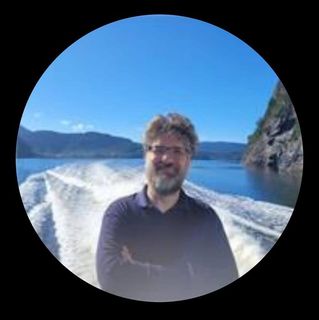Professor Mattias Green
Professor in Physical Oceanography

Affiliations
Contact info
Room: 202 Craig Mair
Phone: 01248 382794
E-mail: m.green@bangor.ac.uk
Google Scholar
ResearchGate
I graduated in Physical Oceanography from Gothenburg University in 1999 and undertook my PhD in physical oceanography at the same university between 2008-2004. I stayed in Gothenburg as a research associate for a further year before moving to Bangor to start as a post-doctoral researcher on the structure of turbulence in shelf seas. In 2008 I was awarded a NERC Advanced Fellowship investigating the effects of sea-level change on the dissipation of tidal energy in the past, present and future and how that may impact on climate. In 2013 Bangor offered me position as Senior Lecturer in Physical Oceanography, in 2016 I was promoted to Reader, and in 2019 I was awarded a Person Chair in physical oceanography.
I am a physical oceanographer using models and observations to explore how the tides interact with other components of the Earth system and how these interactions change over long timescales. I especially focus on how tidally driven mixing influence large-scale ocean circulation and climate; effects of sea-level change (on short time scales) and continental drift (on geological time scales) on the tides; ice-ocean-climate interactions and how melting ice-sheets will affect the earth system; the influence of the tides to allow the ocean to evolve and host life, including tidal dynamics during extinction events.
Contact Info
Room: 202 Craig Mair
Phone: 01248 382794
E-mail: m.green@bangor.ac.uk
Google Scholar
ResearchGate
I graduated in Physical Oceanography from Gothenburg University in 1999 and undertook my PhD in physical oceanography at the same university between 2008-2004. I stayed in Gothenburg as a research associate for a further year before moving to Bangor to start as a post-doctoral researcher on the structure of turbulence in shelf seas. In 2008 I was awarded a NERC Advanced Fellowship investigating the effects of sea-level change on the dissipation of tidal energy in the past, present and future and how that may impact on climate. In 2013 Bangor offered me position as Senior Lecturer in Physical Oceanography, in 2016 I was promoted to Reader, and in 2019 I was awarded a Person Chair in physical oceanography.
I am a physical oceanographer using models and observations to explore how the tides interact with other components of the Earth system and how these interactions change over long timescales. I especially focus on how tidally driven mixing influence large-scale ocean circulation and climate; effects of sea-level change (on short time scales) and continental drift (on geological time scales) on the tides; ice-ocean-climate interactions and how melting ice-sheets will affect the earth system; the influence of the tides to allow the ocean to evolve and host life, including tidal dynamics during extinction events.
Research
Teaching and Supervision
I teach physical oceanography, numerical methods, and ocean dynamics, with focus on masters level modules.
I have been lead supervisor for 5 PhD students to completion, and co-supervised a further 4. Currently, I am leading 4 PhDs and co-supervising a further 4.
Grant Awards and Projects
I have a range of research interests in which PhD projects could be developed. Please contact me by email in the first instance regarding any of the following areas:
Earth system consequences of collapsing ice sheets; tides and mass extinction events; parameterising internal wave driven mixing in ocean models; tidally driven mixing and its effect on climate.
Grant Awards
Tidal mixing and ocean resonance over 22000 years (PI: NERC advanced fellowship, GBP480,000, 2008.)
Fluxes across sloping topography of the North East Atlantic (PI: NERC directed consortium Grant SAMS leading), GBP480,000 to Bangor 2011)
The Environment of the Arctic: Climate, Ocean and Sea Ice (Collaborative partner, NERC Consortium 2011).
Ocean Surface Mixing, Ocean Sub-mesoscale Interaction Study (CO-I: NERC directed consortium, GBP280,000 to Bangor 2011.)
A nutrient and carbon pump over mid-ocean ridges (CO-I: NERC standard grant led by University of Liverpool, GBP25,000 to Bangor 2014.)
Tidal mixing and the overturning circulation during the LGM (PP: NSF standard grant led by Oregon State University)
Measurable metrics for characterisation of large-scale turbulent structures in tidal races for the marine tidal energy industry (CO-I: EPSRC standard grant, GBP 145,000, 2017.)
Santander Mobility Award to visit IDL, Lisbon: £770 as PI (2018).
Milankovitch and Tidal Cycle History (MATCH): NERC standard grant, GBP320,000 to Bangor (2019-2023).
Climate controllers of Archaean Earth: Leverhulme Trust research grant. GBP 248,800 to Bangor (2021-2025)
Fully funded PhD studentships to Bangor: £250,000 as PI, £140,000 as CO-I (2009--present).
Self-funded PhD studentships to Bangor: £26,000 as PI (2017--present).
Education / academic qualifications
- Other , Stuctural and civil engineering UD (Chalmers University of Technology)
- MSc , Physical Oceanography MSci (Gothenburg University)
- PhD , Physical Oceanography PhD (Gothenburg University)
Research outputs (101)
- Published
Evaluating microplastic trapping efficiency in seagrass meadows using hydraulic flume simulations
Research output: Contribution to journal › Article › peer-review
- Published
Earth’s precession rate evolution and rapid fall during the Late Proterozoic
Research output: Contribution to journal › Article › peer-review
- Published
Modeling the Impact of Tides and Geothermal Heat Flux on the Climate of Early Earth
Research output: Contribution to journal › Article › peer-review
Prof. activities and awards (13)
Squishy in the sloshy: paleoecology as a proxy for tides?
Activity: Talk or presentation › Oral presentation
A journey through tides: Jellyfish, dinosaurs, and evolution.
Activity: Talk or presentation › Invited talk
A journey through tides
Activity: Talk or presentation › Invited talk
Projects (5)
Climate conditions of Archaean Earth
Project: Research
Milankovitch and Tidal Cycle History (MATCH)
Project: Research
A nutrient and carbon pump over mid ocean ridges
Project: Research
Media coverage (1)
Someday, Earth will have a final solar eclipse
Press/Media: Expert Comment

